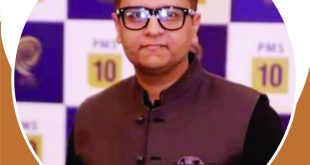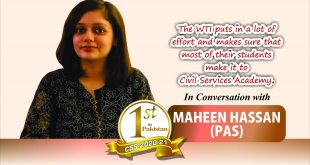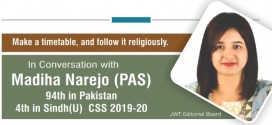Topper PMS 2016 Interview (with a record 196 score)
I found the methodology and the schedule of the Institute quite up to the mark. The faculty was qualified and the environment encouraging
Jahangir’s World Times (JWT): First of all, please tell us about your educational background?
Fazail Mudassar (FM): I was educated at Army Public School, Okara Cantt., from kindergarten to matriculation. Later, I completed my FSc (premedical) from District Public School, Okara. I secured admission in a couple of private medical colleges but due to lack of interest for medical education, I dropped in the middle. Later, I appeared in the initial test of 130th long course and was selected by ISSB, Gujranwala. However, I was withdrawn from PMA Kakul only a few weeks before final passing out. Then, I did BA from PU as a private candidate and also took admission to LLB programme.
JWT: How was your experience at the World Times Institute?
FM: It was quite an enlightening experience for me. I found the methodology and the schedule of the Institute quite up to the mark. The faculty was qualified and the environment encouraging. This helped me a lot in honing my skills and also filled me with confidence.
JWT: What, in your opinion, is the key to getting through compulsory papers of PMS exam, especially that of General Knowledge?
FM: I think one must keep the syllabus in front of oneself, and must prepare these subjects topic-wise. Also, one should sort out topic-wise questions from past papers and solve those and also get them checked by a good teacher. Practice until you gain perfection!
As far as GK is concerned, my strategy was to prepare for the subject with the help of an atlas. Hold a pencil in your hand and put down all relevant information about the continents and countries on the map. For the science part, go through the General Science & Ability published by World Times Publications. I made use of the internet and whenever I came across anything that aroused my curiosity, I googled it instantly.
JWT: How answers should be written to get maximum marks in the written part of PMS exam?
FM: Write howsoever you like; with headings, but keep just one thing in mind: your answers should reflect a clear understanding of what has been asked. The answer should properly be structured; it must be concluded logically.
 JWT: Should there be some word limit kept in mind while writing answers?
JWT: Should there be some word limit kept in mind while writing answers?
FM: Obviously, the time itself is a determining factor when it comes to the word count. One impression that is very common among the aspirants is that filling pages would help them secure good marks, but that is not the case. As Alexander Pope famously said, “Words are like leaves where they most abound, Much fruit of sense beneath is rarely found.” Therefore, quality of the content does matter a lot.
JWT: How did you structure your Essay?
FM: I attempted essay on a current affairs topic. I employed the question-word approach i.e. answering the why, what, how, when, where of the topic. Then I ‘SEPTEMBER-ed the topic’, that is, I took social, economic, political, technological, environmental, moral, international and regional views on the topic. For essay, aspirants should write at leisure but must save 5 to 10 minutes for an impressive conclusion.
JWT: As you have made a history by breaking all previous records of PMS Interview, what was your strategy to prepare for that?
FM: First of all, I am just a fakeer/darvesh type of person; it was sheer Rehmat of Allah Almighty that he graced me with this distinction. I believed records are made only to be broken by later challengers. One thing I would advise the prospective aspirants is to speak with conviction and passion. I think my natural style of communication was what distinguished me from other candidates. The backbone of the interview is how you introduce yourself to the panel. The introduction is the precursor of the later conversation. So, it should be concise and should give way to a conversation that encompasses the strong areas of your personality. Giving interview is an art, it should be practiced and perfected by enhancement of knowledge, holding discussions and forming opinions and then getting them questioned, and finally attending mock interviews before the D-Day. I used to read literature and current affairs besides watching documentaries and holding detailed discussions with my father on different topics. I also made apt use of social media for the same purpose by liking the pages of renowned international journals and periodicals (e.g. Economist, Foreign Policy and others). I used to read articles on daily basis.
JWT: What were the questions you found challenging during the interview?
FM: Opinion-based questions are the trickiest part. It is crucial and difficult to tackle as during this part the panel is gauging the intellectual faculties of the candidate as well as his understanding and processing of the knowledge. The depth of knowledge on the topics that the candidate claims to hold knowledge about is also under the microscope.
JWT: Who deserves the credit for your success?
FM: My father Muhammad Aslam Tahir-ul-Qadri, my mother Ijaz Sarwer, my brothers Shamail Ahmed, Shahadat Ali and my teachers, especially Sir Badar uz Zaman Qureshi, Sir Adeel Niaz, Madam Tehmina, Sir Osman Khan, and last but not least the great Nasir Chohan.
JWT: How one should choose Optional Subjects?
FM: On the basis of one’s interests and scoring pattern.
JWT: Is it better to attempt optional papers in Urdu or one should go with English only?
FM: Other than Islamiat, it is better to go for English.
Advice for fresh aspirants
Smart working and optimum use of time is the key to success. Competitive exams should become a part of your routine instead of an eccentric approach of copying someone’s timetable. “Go to the last mile and enjoy it!”
My Interview Experience
I was waiting in the hallway, when I was called into the interview room. I greeted the panellists by saying Assalam-o-Alaikum. It was a four-member panel comprising Ch. Seerat Asghar Jaura, Syed Mubashar Raza, a Departmental Representative (DR) and Chairman PPSC Lt Gen (Retd) Sajjad Akram as its head.
In the beginning, Mr Chairman asked me to introduce myself. I started with my educational background; then, mentioned my military training and finally told about my interests and hobbies. I mentioned reading of book along with swimming, horse-riding and collection of antique pens as my hobbies.
The DR asked me about the situation in Syria. I explained that, terming it simply confusing, as there were too many parties to the conflict and all of them were trying to gain maximum ground with the help of international powers. I further called the situation perplexing as many international actors were, at times, funding the elements that were working against their allies e.g. Turkey is a US ally but the US is funding PKK and other Kurd groups fighting ISIS, disturbing, therefore, the balance of power and changing the patterns of diplomatic relations between the states.
Then, a member of the panel asked me: “Who are the ‘Universal Orphans’?” Since I had no idea about this term, I excused. Sir Raza asked some questions on economics but I excused as I was not very well conversant with the nitty-gritty of the subject. The DR asked me about the difference between ‘Great Britain’ and the ‘United Kingdom’ which I explained satisfactorily.
Since I had mentioned book-readng as my hobby, I was asked about my preferred literary genres. I replied that I read Urdu prose and poetry along with books on international relations, politics, strategic studies, etc. Sir Raza asked about the names of the authors of some books. I replied accordingly. After that, he asked if I had the pleasure of reading some Urdu short stories (afsana). I told him that I didn’t have any profound interest in that genre but I had read a short story by Mukhtar Masood due to my interest in other literary masterpieces of the said author, especially, his magnum opus ‘Awaz-e-Dost’. The discussion, then, moved to Mukhtar Masood and his works – I even quoted some excerpts from ‘Awaaz-e-Dost’ such as ‘Qahat mein mot arzaan hoti hai aur qahat ur rijaal mein zindagi’. The undertones of the Indo-Muslim civilization and the Pakistan Movement in the works of Mukhtar Masood also came under discussion.
Sir Seerat Asghar asked me about the depiction of Iranian Revolution in ‘Looh-e-Ayyam’ (another book by Mukhtar Masood). He, then, inquired about Mushtaq Ahmed Yousufi, the second author I had mentioned among my favourites. He asked me how many books of the literary giant I had read so far. To this, I replied that I had read all four of them. He, then, asked to quote something. I quoted some texts from ‘Aab-e-Gumm’ and ‘Zarguzisht’. He himself narrated some of the text to the other members of the panel showing his deep interest and understanding of the literature.
Mr Chairman, Lt Gen (Retd) Sajjad Akram, took the discussion forward by asking some questions on foreign policy of Pakistan with special focus on Afghan imbroglio, security of Pakistan and the Indian dimension. The future of Kashmir also came under discussion.
Sir Raza asked about my opinion on the question whether the 18th Amendment is detrimental to the Federation of Pakistan. I replied, “I don’t know what will be the final outcome of the Amendment, but the capacity issues of the provinces in handling the devolved subjects are visible enough and it is negatively impacting the service delivery across in the public sector.” In addition, I highlighted that Pakistan was lagging behind in its international commitments vis-à-vis Sustainable Development Goals (SDGs).
Interview Tips for PMS 2017 aspirants
- Introduction is the backbone of the interview. So prepare it well.
- Be original and don’t copy the personality of someone else.
- Appear in mock interviews to identify your weak areas.
- Interview is a dialogue not a monologue. So, be expressive.
- Read one or two good titles before the interview day.
- Don’t leave loose ends in conversation. Be crisp and concise.
- Be accommodative and respectful to the views of interviewers and do not nullify or deny their opinion or views.
- Be courteous and keep your tone low, but audible.
- Be sure and confident, keep your voice firm, don’t mumble.
- Listen to questions patiently and think before answering them in haste.
- Don’t be judgmental; refrain from passing sweeping statements.
- Dress good and recite Darood Shareef.
 Jahangir's World Times First Comprehensive Magazine for students/teachers of competitive exams and general readers as well.
Jahangir's World Times First Comprehensive Magazine for students/teachers of competitive exams and general readers as well.




